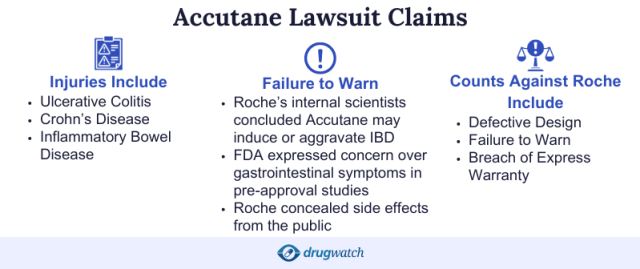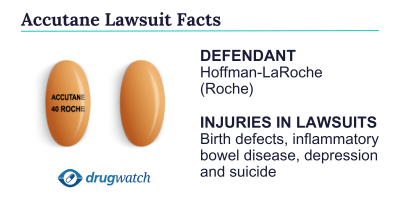Accutane Lawsuits
Most Accutane lawsuits claimed the drug Accutane (the brand name for isotretinoin, which treats severe acne) caused Crohn’s disease, inflammatory bowel disease (IBD), and other gastrointestinal problems. A court dismissed the majority of the more than 7,000 lawsuits filed against Swiss manufacturer Hoffmann-La Roche Inc. and Roche Laboratories Inc. (collectively Roche) in 2014. The New Jersey Supreme Court dismissed another 532 lawsuits in 2018.
Our content is developed and backed by respected legal, medical and scientific experts. More than 30 contributors, including product liability attorneys and board-certified physicians, have reviewed our website to ensure it’s medically sound and legally accurate.
legal help when you need it most.
Drugwatch has provided people injured by harmful drugs and devices with reliable answers and experienced legal help since 2009. Brought to you by Wilson & Peterson LLP, we've pursued justice for more than 20,000 families and secured $324 million in settlements and verdicts against negligent manufacturers.
More than 30 contributors, including mass tort attorneys and board-certified doctors, have reviewed our website and added their unique perspectives to ensure you get the most updated and highest quality information.
Drugwatch.com is AACI-certified as a trusted medical content website and is produced by lawyers, a patient advocate and award-winning journalists whose affiliations include the American Bar Association and the American Medical Writers Association.
About Drugwatch.com
- 15+ Years of Advocacy
- $324 Million Recovered for Clients
- 20,000 Families Helped
- A+ BBB Rating
- 4.9 Stars from Google Reviews
Testimonials
I found Drugwatch to be very helpful with finding the right lawyers. We had the opportunity to share our story as well, so that more people can be aware of NEC. We are forever grateful for them.
- Legally reviewed by Julie Lawson Timmer, Esquire
- Last update: June 26, 2025
- Est. Read Time: 4 min read
- MDL
- MDL 1626 in the Middle District of Florida
- Settlements/Verdicts
- $56 million in jury verdicts (overturned)
Latest Accutane Lawsuit Updates
As of December 2025, there are no new updates in this litigation, and Drugwatch doesn’t know of any lawyers who are taking these cases.
Thousands of people who suffered Accutane side effects filed lawsuits claiming the drug’s maker, Roche, did not warn them about the dangers of the medication. The bulk of litigation dealt with Crohn’s disease and ulcerative colitis.
-
2018:
On October 3, 2018, the New Jersey Supreme Court dismissed 532 suits, holding that (1) New Jersey law applied (rather than the laws of the 44 other states where most of the plaintiffs lived), and (2) under New Jersey’s Product Liability Act (PLA) the labels provided by Roche after April 2002, which were FDA approved, provided adequate warnings about the drug’s risks relating to . (The PLA provides a presumption that FDA-approved labels are adequate, and although that presumption can be rebutted (defeated) by plaintiffs, the presumption provides pharmaceutical companies greater protection under New Jersey law as compared to many other states). This ruling effectively ended all remaining suits in MCL 271. On August 1, 2018, the New Jersey Supreme Court reversed the appellate court that reinstated the 2076 cases, holding the trial court acted correctly in barring the testimony of plaintiffs’ two experts. A number of medical organizations joined an amicus brief supporting Roche and stating the reasonable medical conclusion is that Accutane does not cause Crohn’s disease. In response to the August 1, 2018 ruling, the American Medical Association issued a statement in support of Roche and against what it called “abusive litigation against physicians.”
-
2017:
An appellate court reinstated 2,076 cases that were dismissed in 2015 by the New Jersey multicounty litigation judge. New Jersey’s top court upheld Andrew McCarrell’s verdict from 2010, but it was overturned a second time a few months later.
-
2015:
A judge in New Jersey dismissed more than 2,000 cases, holding that the testimony of two plaintiffs’ experts (who offered evidence showing a causal link between Accutane usage and Crohn’s disease) was scientifically unsound and should be barred. Plaintiffs appealed.
-
2010:
A New Jersey jury awarded $25.16 million to Andrew McCarrell in his second trial against Roche. His original verdict of $2.62 million was overturned, and he was granted a new trial.
-
2005:
An Accutane multicounty litigation (MCL) is petitioned and later formed in the New Jersey Atlantic County Court (MCL No. 271).
-
2002:
The panel on multidistrict litigation consolidated Accutane lawsuits in multidistrict litigation in the Middle District of Florida. Injuries included were “ulcerative colitis, Crohn’s disease, colitis, inflammatory bowel disease, irritable bowel syndrome, rectal bleeding, diarrhea, abdominal pain, or other injury.”

Suicide, IBD and Other Injuries Related to Accutane
While some people who sued Roche blamed Accutane for psychosis, depression and suicide, most lawsuits claimed the drug caused IBD. IBD is a condition that involves chronic inflammation of the gastrointestinal tract. IBD usually manifests in one of two diseases: ulcerative colitis or Crohn’s disease. IBD is a permanent condition.
Accutane lawsuits said the drug is “defective” and “dangerous to human health, unfit and unsuitable to be marketed and sold in commerce.”
Accusing Roche of having knowledge of the link between gastrointestinal symptoms and the acne medication, plaintiffs claimed the drug “lacked proper warnings as to the dangers associated with its use.”
“Since 1984, there have been suggestions that Accutane might be linked to various forms of inflammatory bowel disease, including Crohn’s disease. Despite numerous studies on the subject, no such linkage has been found — at least not with substantial reliability.”
Before the FDA approved Accutane in 1982, it raised concerns about these issues. Despite this, Roche did not include any warnings about the risk of IBD, lawsuits claim.
According to findings by the New Jersey Supreme Court in its October 2023 opinion, by April 2002, Roche issued a number of FDA-approved warning materials and labels, which it issued to physicians prescribing the drug as well as pharmacists and patients. The materials stated that IBD had been associated with the use of Accutane and that symptoms of IBD had been reported to remain after use of Accutane had stopped.
In the Accutane litigation, Roche argued that there is no reliable evidence linking Accutane to IBD or Crohn’s disease, and maintained it have given ample warning to patients about potential side effects.
Accutane Verdicts – Later Vacated, Reversed, or Overturned on Appeal
A number of Accutane suits went to trial and resulted in jury verdicts requiring Roche to pay more than $50 million to several plaintiffs. Roche was able to have them vacated, reversed, or overturned on appeal.
Accutane Case Study
Andrew McCarrell v. Roche
Andrew McCarrell sued Roche in 2003, alleging Roche had failed to adequately warn about the risks of Accutane.
Accutane Usage:
In June 1995, McCarrell started taking Accutane and he took it for about four months as an acne treatment.
Injuries Claimed:
About 10 months after he stopped taking Accutane, he began experiencing intense stomach pain. A few months later, he was diagnosed with IBD. Ultimately, after constant rectal bleeding and weight loss, he underwent multiple surgeries. Doctors removed his colon and rectum. He lived with a colostomy bag for over four years until he had another surgery to reattach a j-pouch to his small intestine. He continues to suffer from abdominal cramping, multiple bowel movements and incontinence.
Relief Sought:
Damages and punitive damages.
Conclusion:
Andrew McCarrell won the first major Accutane verdict in 2007. A jury agreed with his failure to warn claim and awarded him $2.6 million. Roche appealed that verdict, and the appellate court reversed the trial court on evidentiary grounds and ordered a new trial. In 2010, at the second trial, a jury again agreed with McCarrell’s failure to warn claim and awarded him $25 million. However, after being vacated and reinstated, the verdict was ultimately overturned in May 2017.
Other Accutane Cases
Historically, Accutane litigation has favored the manufacturer. Judges dismissed most lawsuits and overturned jury verdicts that had awarded millions of dollars to plaintiffs.
Julia Bishop
In 2002, Julia Bishop filed a lawsuit against Roche. Her 15-year-old son, Charles Bishop, had crashed a Cessna into the 28th floor of the Bank of America Building in Tampa, Florida in January of that year.
Bishop claimed Accutane caused her son to commit suicide. She demanded $70 million from Roche, The Tampa Tribune reported. Five years later, Bishop withdrew her lawsuit. Her attorneys said she was emotionally and physically unable to continue due in part to alleged personal attacks by the drugmaker.
Carla Gray
Carla Gray of Ada, Oklahoma, took her Accutane depression case to trial in 2002. She asked for $3 million because the drug company failed to warn about depression. A jury denied her claim.
Kathleen Rossitto and Riley Wilkinson
Kathleen Rossitto and Riley Wilkinson won their lawsuits (which were tried together) in June 2012. Rossitto and Wilkinson claimed Accutane caused them to develop IBD. A New Jersey court ordered Roche to pay $18 million in compensatory damages.
The women were to receive $9 million each. Roche appealed, and the verdict was vacated and remanded for new trial in July 2016 after the appeals court found that the trial court judge “seriously erred” when it allowed some revelations in court while restricting others. The court found these mistakes serious enough to warrant a new trial. Drugwatch is not aware of a new trial being brought.
Calling this number connects you with a Drugwatch.com representative. We will direct you to one of our trusted legal partners for a free case review.
Drugwatch.com's trusted legal partners support the organization's mission to keep people safe from dangerous drugs and medical devices. For more information, visit our partners page.




